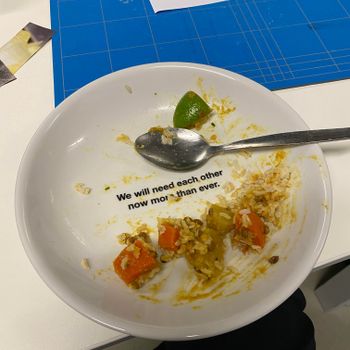During the residency, I wished to initiate discussions on the working conditions in the arts sector and to explore the shortcomings and exploitative tactics of the current system. One of the dialogue partners turned out to be Eesti Noorte Kaasaegse Kunsti Liit (ENKKL), a non-institutional association gathering active artists. ENKKL practices collectivity, valuing interdisciplinarity, creative exchange and the importance of common space for discussion among artists. They award a weekly Young Contemporary Artist Prize, an idea that was born out of the irony of arts politics of recognition that always revolves around an exhibition and competition format, giving the impression that 4-5 artists form the face of a generation. The weekly prize is a framed diploma and a post on the association's social media.
The collectivity and institutional critique through which ENKKL frames its activities speaks to the need to address the challenges of the field collectively. Our conversations revolved around the fragmentation of the cultural field, institutional hierarchies of power and established career paths, returning in one way or another to the role of education. The reason is obvious - going to art school is usually necessary to be professionally involved in contemporary art, to 'train' critical thinking and to acquire the stamp of institutional credibility. Professional prestige and the desire for greater personal freedom are leading factors in the development of neoliberal thinking in the arts, originating in the academy. But the idea of the freedom to do whatever you want is cynical in an economy that has already paved the way for individualistic and competitive careers.
Andrea Fraser, one of the main protagonists of institutional critique, has said that the institution does not actually exist outside us, but inside us, and we cannot get outside ourselves. It shapes our embodied and habitual ways of working and interacting. The neoliberal condition creates a constant state of busyness, demanding haste, productivity and a focus on results, ignoring subnormal rhythms and ways of working. How can we address the institution within ourselves without placing the responsibility on the individual? How to critically examine entrenched practices, to identify the structural background of problems in the cultural field and to get rid of taken-for-granted 'truths'?
The showing is open to public, and creatives working in the cultural field are particularly welcome. Eesti Noorte Kaasaegse Kunsti Liit will present its activities and objectives. This will be followed by a short presentation and workshop inspired by the concept of the creative biotope. Visitors will have the opportunity to reflect and identify the factors that enable or hinder them to do their work in a healthy and harmonious way. Kanuti's Cellar Hall is adapted to a collaborative learning environment, offering an insight into the amplitude of topics covered during the residency through texts, books, notes and fieldwork materials.
At the end of the showing Üle Prahi collective will offer a meal cooked with food rescued from the dumpsters. As in the cash-strapped cultural sector, the narrative of austerity and food scarcity is constantly repeated to us. Yet the dupmsters are still full of food... The actions of Üle Prahi collective represent sustainable and communal practice, illustrating one possible way of adapting to a changing world.
Residency is supported by the Cultural Endowment of Estonia
